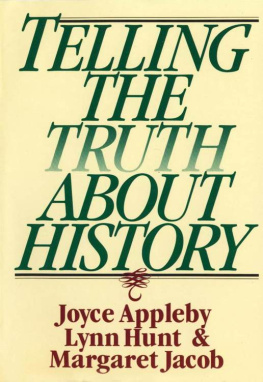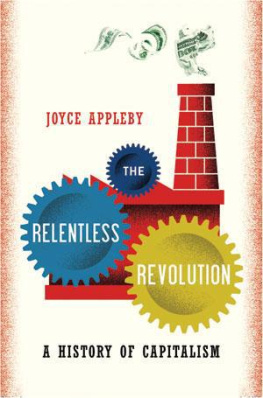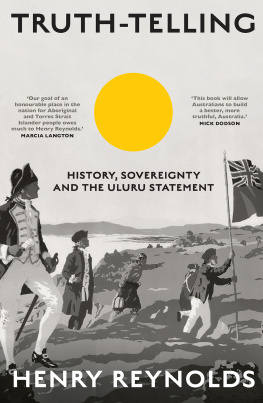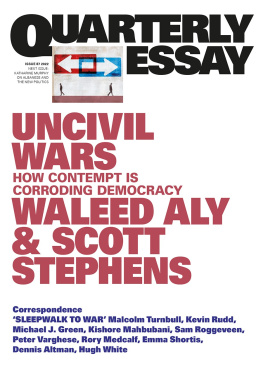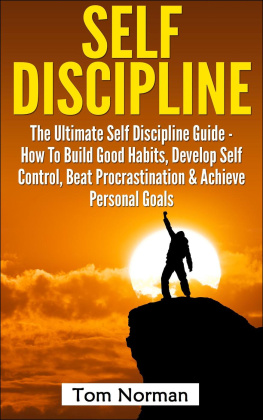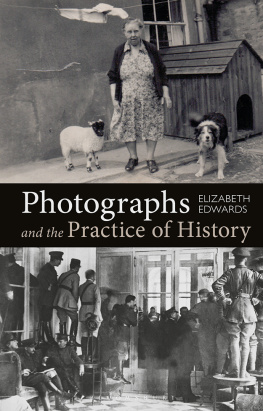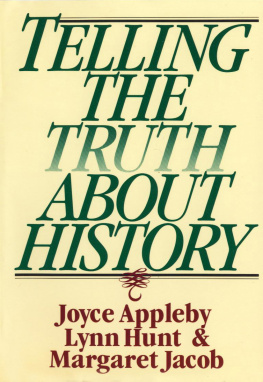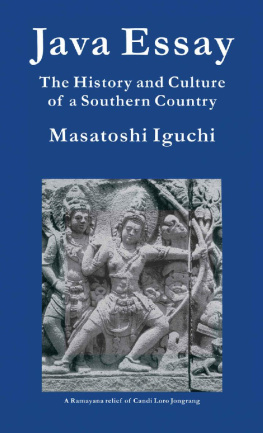Joyce Appleby - Telling the Truth about History
Here you can read online Joyce Appleby - Telling the Truth about History full text of the book (entire story) in english for free. Download pdf and epub, get meaning, cover and reviews about this ebook. year: 2011, publisher: W. W. Norton & Company, genre: Religion. Description of the work, (preface) as well as reviews are available. Best literature library LitArk.com created for fans of good reading and offers a wide selection of genres:
Romance novel
Science fiction
Adventure
Detective
Science
History
Home and family
Prose
Art
Politics
Computer
Non-fiction
Religion
Business
Children
Humor
Choose a favorite category and find really read worthwhile books. Enjoy immersion in the world of imagination, feel the emotions of the characters or learn something new for yourself, make an fascinating discovery.
- Book:Telling the Truth about History
- Author:
- Publisher:W. W. Norton & Company
- Genre:
- Year:2011
- Rating:4 / 5
- Favourites:Add to favourites
- Your mark:
- 80
- 1
- 2
- 3
- 4
- 5
Telling the Truth about History: summary, description and annotation
We offer to read an annotation, description, summary or preface (depends on what the author of the book "Telling the Truth about History" wrote himself). If you haven't found the necessary information about the book — write in the comments, we will try to find it.
A fascinating historiographical essay. . . . An unusually lucid and inclusive explication of what it ultimately at stake in the culture wars over the nature, goals, and efficacy of history as a discipline.Booklist
Telling the Truth about History — read online for free the complete book (whole text) full work
Below is the text of the book, divided by pages. System saving the place of the last page read, allows you to conveniently read the book "Telling the Truth about History" online for free, without having to search again every time where you left off. Put a bookmark, and you can go to the page where you finished reading at any time.
Font size:
Interval:
Bookmark:
J OYCE A PPLEBY
Liberalism and Republicanism in the Historical Imagination
Capitalism and a New Social Order
Economic Thought and Ideology in Seventeenth-Century England
L YNN H UNT
The Invention of Pornography (editor)
The Family Romance of the French Revolution
The New Cultural History (editor)
Politics, Culture and Class in the French Revolution
Revolution and Urban Politics in Provincial France
M ARGARET J ACOB
The Politics of Western Science (editor)
Living the Enlightenment
The Cultural Meaning of the Scientific Revolution
The Radical Enlightenment
The Newtonians and the English Revolution

W.W. NORTON & COMPANY
NEW YORK LONDON
Copyright 1994 by Joyce Appleby, Lynn Hunt, and Margaret Jacob.
All rights reserved .
First published as a Norton paperback 1995
Library of Congress Cataloging-in-Publication Data
Appleby, Joyce Oldham.
Telling the truth about history / Joyce Appleby, Lynn Hunt,
Margaret Jacob.
p. cm.
Includes bibliographical references (p.).
1. United StatesHistoriography. 2. History. I. Hunt, Lynn Avery. II. Jacob, Margaret C., 1943III. Title.
E175.A67 1994
973.072dc20 93-11536
ISBN: 978-0-393-31286-7
W. W. Norton & Company, Inc.
500 Fifth Avenue, New York, N.Y. 10110
www.wwnorton.com
W.W. Norton & Company Ltd.
Castle House, 75/76 Wells Street, London WIT 3QT
To our students and our teachers
PART ONE
Intellectual Absolutisms
PART TWO
Absolutisms Dethroned
PART THREE
A New Republic of Learning
T HIS BOOK has been a real collaboration, and as a consequence all of the chapters express the views of all of the authors. Formal and informal conversations with colleagues and students have helped us to clarify our positions. None of them bears any responsibility for the positions we have takenindeed, on occasion some have argued with us vigorously. We are especially grateful for detailed readings of an earlier version provided by Sheryl Kroen, Ruth Bloch, Drew Gilpin Faust, Phyllis Mack, Thomas Haskell, Frank Appleby, Martha Avery, Eric Hobsbawm, Donald Kalish, Joseph Rouse, Gabrielle Spiegel, Karen Orren, Bonnie Smith, Spencer Weart, James Miller, Virginia Yans, Carolyn Dewald, and Paula Scott.
T HIS BOOK confronts head-on the uncertainty about values and truth-seeking and addresses the controversies about objective knowledge, cultural diversity, and the political imperatives of a democratic education. It does so by focusing on the project of history, specifically by asking what people can know about the past that will help them elucidate the present. Our central argument is that skepticism and relativism about truth, not only in science but also in history and politics, have grown out of the insistent democratization of Western society. The opening of higher education to nearly all who seek it, the rewriting of American history from a variety of cultural perspectives, and the dethroning of science as the source and model for what may be deemed true, all are interrelated phenomena. It is no accident that they occurred almost simultaneously.
More people have now been to college or university than was the case at any time in the past. We should, and indeed do, know many things. Yet confidence in the value and truth of knowledge eludes just about everyone. This is especially true of historical knowledge. For example, once there was a single narrative of national history that most Americans accepted as part of their heritage. Now there is an increasing emphasis on the diversity of ethnic, racial, and gender experience and a deep skepticism about whether the narrative of Americas achievements comprises anything more than a self-congratulatory story masking the power of elites. History has been shaken right down to its scientific and cultural foundations at the very time that those foundations themselves are being contested.
In the decades since World War II the old intellectual absolutisms have been dethroned: science, scientific history, and history in the service of nationalism. In their placealmost as an interim reportthe postwar generation has constructed sociologies of knowledge, records of diverse peoples, and histories based upon group or gender identities. Women, minorities, and workers populate American and Western histories where formerly heroes, geniuses, statesmenicons of order and the status quoreigned unchallenged. The postwar generation has questioned fixed categories previously endorsed as rational by all thoughtful men, and has denaturalized social behavior once presumed to be encoded in the very structure of humanness. As members of that generation, we routinely, even angrily, ask: Whose history? Whose science? Whose interests are served by those ideas and those stories? The challenge is out to all claims to universality expressed in such phrases as Men are, Naturally science says and As we all know
In contrast to the critics who have decried the impending death of Western civilization under the impact of the democratization of education, we endorse the insights and revisions made possible by that democratization. This book embraces a healthy skepticism, but it rejects the cynicism and nihilism that has accompanied contemporary relativism. It lays out a vision of the past and takes an intellectual stance for the present that seeks to promote an ever more democratic society. To achieve this aim, it is essential to confront the perennial controversies over national history, scientific integrity, and the possibility of truth and objectivity.
A host of questions present themselves. Do people need history, and if so, whose history and for what purposes? Is history a science or an art? Is history always in some sense propaganda? The answers to these questions might once have been obvious to educated people, but they are obvious no longer. At least one thing seems clear, however: rarely has history been such a subject of controversy. In the former communist world, aroused citizens toppled statues of Lenin and other discredited national heroes and threw out history professors and textbooks as hopelessly contaminated by Marxist ideology. When repressive governments fall from power, whether on the left or on the right, the citizens rush to find historical evidence of the governments previous misdeeds in order to fortify the will to reconstitute their nation. Because history and historical evidence are so crucial to a peoples sense of identity, the evidence itself often becomes the focus of struggle. This is clear in the disturbing efforts of some groups to deny the reality of Hitlers final solution. Even in countries such as Japan where the state reserves the right to publish school textbooks, historians have fought in the courts for the ruling that the books must strive for truth and not for what will make people feel good about themselves.
In the United States, the effort to establish history standards for elementary, middle, and high schools set off a controversy that some interpreted as another round in the cultural wars begun in the 1960s. Critics of the older textbooks found them Eurocentric, racist, sexist, and homophobic, reinforcing the worst racial and sexual stereotypes rather than helping children and young people go beyond them. They celebrated the achievements, it was said, of dead white European males rather than showing the contributions of women, minorities, and the oppression of gays and other excluded groups. Whole new teams of writers have been hired to produce histories with perspectives thought to be more in tune with the values of a socially diverse society.
Font size:
Interval:
Bookmark:
Similar books «Telling the Truth about History»
Look at similar books to Telling the Truth about History. We have selected literature similar in name and meaning in the hope of providing readers with more options to find new, interesting, not yet read works.
Discussion, reviews of the book Telling the Truth about History and just readers' own opinions. Leave your comments, write what you think about the work, its meaning or the main characters. Specify what exactly you liked and what you didn't like, and why you think so.

